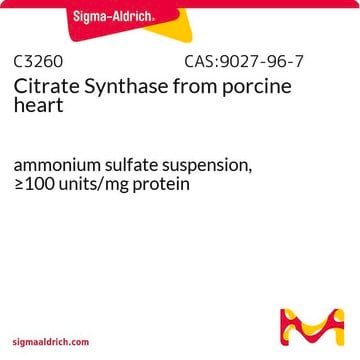SRP0288
ATP Citrate Lyase Active human
recombinant, expressed in baculovirus, ≥90% (SDS-PAGE)
Synonym(s):
ACLY, ATP-citrate synthase, ATPCL, CLATP
Sign Into View Organizational & Contract Pricing
All Photos(1)
About This Item
UNSPSC Code:
12352204
NACRES:
NA.54
Recommended Products
General description
Human ATP citrate lyase (ACLY) (GenBank Accession No. NM_001096), full length, with N-terminal GST tag, MW = 147 kDa, expressed in baculovirus expression system.
Application
Active human ATP citrate lyase is useful for the study of enzyme kinetics, screening inhibitors, and selectivity profiling. Active human ATP citrate lyase has been used in a study to ascertain the nature of the catalytic phosphorylation that initiates the ACL reaction, and to identity the active site residues involved. Active human ATP citrate lyase has also been used in a study to analyze tumor metabolism to reveal mitochondrial glucose oxidation in genetically diverse human glioblastomas.
Biochem/physiol Actions
ATP citrate lyase is an enzyme involved in fatty acid synthesis that generates cytosolic acetyl-CoA and oxaloacetate from citrate and CoA. ATP citrate lyase is often upregulated in cancer.
Unit Definition
One unit is defined as the amount of enzyme required to convert 1 pmol of ADP to ATP/min at 37°C.
Physical form
Formulated in 25 mM Tris-HCl, pH 8.0, 100 mM NaCl, 0.05% Tween-20 and 10% glycerol.
Preparation Note
Thaw on ice. Upon first thaw, briefly spin tube containing enzyme to recover full content of the tube. Aliquot enzyme into single use aliquots. Store remaining undiluted enzyme in aliquots at -70°C. Note: Enzyme is very sensitive to freeze/thaw cycles.
Storage Class Code
10 - Combustible liquids
WGK
WGK 2
Flash Point(F)
Not applicable
Flash Point(C)
Not applicable
Choose from one of the most recent versions:
Certificates of Analysis (COA)
Lot/Batch Number
Don't see the Right Version?
If you require a particular version, you can look up a specific certificate by the Lot or Batch number.
Already Own This Product?
Find documentation for the products that you have recently purchased in the Document Library.
Evaluation of the safety and efficacy of hydroxycitric acid or Garcinia cambogia extracts in humans.
Fabiola Márquez et al.
Critical reviews in food science and nutrition, 52(7), 585-594 (2012-04-26)
Several studies have shown that Garcinia cambogia plays an important role in the regulation of endogenous lipid biosynthesis. This effect is specially attributed to (-)-hydroxycitric acid (HCA) inhibiting the enzyme ATP-dependent citrate lyase, which catalyzes the cleavage of citrate to
Isaac Marin-Valencia et al.
Cell metabolism, 15(6), 827-837 (2012-06-12)
Dysregulated metabolism is a hallmark of cancer cell lines, but little is known about the fate of glucose and other nutrients in tumors growing in their native microenvironment. To study tumor metabolism in vivo, we used an orthotopic mouse model
Fan Fan et al.
Biochemistry, 51(25), 5198-5211 (2012-06-05)
ATP citrate lyase (ACL) catalyzes an ATP-dependent biosynthetic reaction which produces acetyl-coenzyme A and oxaloacetate from citrate and coenzyme A (CoA). Studies were performed with recombinant human ACL to ascertain the nature of the catalytic phosphorylation that initiates the ACL
Articles
Fatty acid synthesis supports cancer cell proliferation, essential for membrane generation, protein modification, and bioenergetics.
Our team of scientists has experience in all areas of research including Life Science, Material Science, Chemical Synthesis, Chromatography, Analytical and many others.
Contact Technical Service






